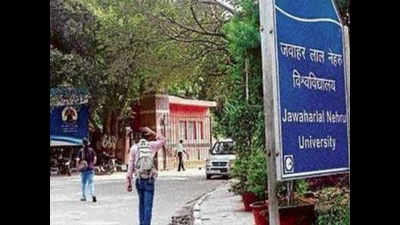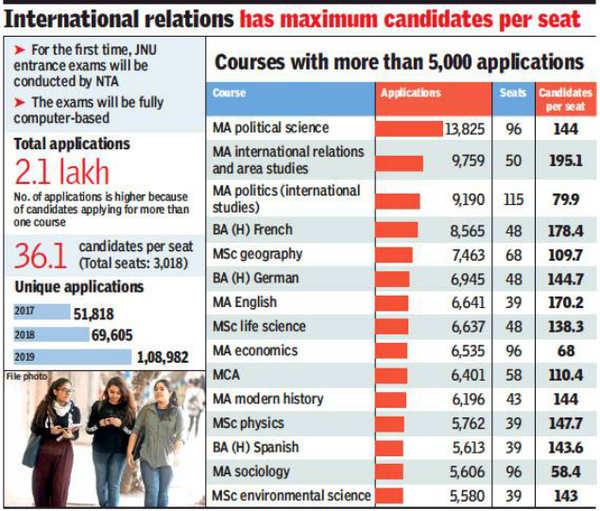- News
- City News
- delhi News
- The heat’s on: For every seat at JNU, you have 35 others to compete with
Trending
This story is from May 6, 2019
The heat’s on: For every seat at JNU, you have 35 others to compete with
Getting admission in Jawaharlal Nehru University has got tougher. From an average of 20 candidates per seat in the past, it has risen to 36 per seat this time.

Jawaharlal Nehru University
NEW DELHI: Getting admission in Jawaharlal Nehru University has got tougher. From an average of 20 candidates per seat in the past, it has risen to 36 per seat this time.
Just how much tougher it has become can be gauged from the fact that MA political science has 144 candidates per seat. Among the 15 courses receiving 5,000 or more applications, MA international relations and area studies recorded the stiffest competition with 195.1 candidates per seat, followed by BA (honours) French with 178.4.

Introducing computer-based entrance for the first time, the university received an all-time high number of applications—1,08,982. This is up from 60,605 last year. However, due to many candidates applying for multiple courses, the total applications are 2,13,417. In 2018, it as around 1 lakh.
According to the course-wise seat matrix and the application data sourced from NTA, the competition gets tougher for the undergraduate language courses with French, German, English and Spanish recording over 140 candidates per seat. History, political science, environmental science, life science and computer applications in the postgraduate studies are also recording over 100 candidates per seat. And these are the courses which have received higher number of applications, each recording well over 5,000.
“It is a reflection of the all-round progress JNU is making. During the last three years, our sponsored research funding has gone up significantly to about Rs 105 crore, which is an indication of the state-of-the-art research done at JNU. The university has also expanded its academic programmes with the establishment of School of Engineering and Atal Bihari Vajpayee School of Management and Entrepreneurship. Many of our faculty members are highly cited authors and publish in highly ranked journals such as Nature communications. During 2016 - 2018, our faculty members have published more than 2,000 journal papers apart from publishing a large number of books,” said vice-chancellor M Jagadesh Kumar.
Foreign language courses continue to be among the most sought-after programmes. For example, 8,565 candidates applied for BA (honours) French which has 48 seats, while BA (honours) German received 6,945 applications for its 48 seats. In the sciences, physics, environmental science, life science and geography all received over 5,000 applications.
Stating that the increase in applications are in sync with the top areas of research the university has been engaged with, Kumar added, “Our cutting edge researches are happening in environmental chemistry, nano sciences, cancer biology, infection biology, vaccine development, computational linguistics, big data analytics, history, politics and international studies, among others. Besides, JNU has research collaborations with major institutes both within India and abroad.
“A recent example is the collaboration between JNU and Heidelberg University in Germany to conduct a joint PhD programme. Many such initiatives are on the anvil. The university has also revised its IPR policy and is in the process of registering a section 8 company to enable the establishment of startups.”
Just how much tougher it has become can be gauged from the fact that MA political science has 144 candidates per seat. Among the 15 courses receiving 5,000 or more applications, MA international relations and area studies recorded the stiffest competition with 195.1 candidates per seat, followed by BA (honours) French with 178.4.

Introducing computer-based entrance for the first time, the university received an all-time high number of applications—1,08,982. This is up from 60,605 last year. However, due to many candidates applying for multiple courses, the total applications are 2,13,417. In 2018, it as around 1 lakh.
The JNU Entrance Exam (JNUEE) 2019 will be conducted by the National Testing Agency (NTA) between May 27 and May 30. The results will be available on June 1.
According to the course-wise seat matrix and the application data sourced from NTA, the competition gets tougher for the undergraduate language courses with French, German, English and Spanish recording over 140 candidates per seat. History, political science, environmental science, life science and computer applications in the postgraduate studies are also recording over 100 candidates per seat. And these are the courses which have received higher number of applications, each recording well over 5,000.
“It is a reflection of the all-round progress JNU is making. During the last three years, our sponsored research funding has gone up significantly to about Rs 105 crore, which is an indication of the state-of-the-art research done at JNU. The university has also expanded its academic programmes with the establishment of School of Engineering and Atal Bihari Vajpayee School of Management and Entrepreneurship. Many of our faculty members are highly cited authors and publish in highly ranked journals such as Nature communications. During 2016 - 2018, our faculty members have published more than 2,000 journal papers apart from publishing a large number of books,” said vice-chancellor M Jagadesh Kumar.
Foreign language courses continue to be among the most sought-after programmes. For example, 8,565 candidates applied for BA (honours) French which has 48 seats, while BA (honours) German received 6,945 applications for its 48 seats. In the sciences, physics, environmental science, life science and geography all received over 5,000 applications.
Stating that the increase in applications are in sync with the top areas of research the university has been engaged with, Kumar added, “Our cutting edge researches are happening in environmental chemistry, nano sciences, cancer biology, infection biology, vaccine development, computational linguistics, big data analytics, history, politics and international studies, among others. Besides, JNU has research collaborations with major institutes both within India and abroad.
“A recent example is the collaboration between JNU and Heidelberg University in Germany to conduct a joint PhD programme. Many such initiatives are on the anvil. The university has also revised its IPR policy and is in the process of registering a section 8 company to enable the establishment of startups.”
End of Article
FOLLOW US ON SOCIAL MEDIA










